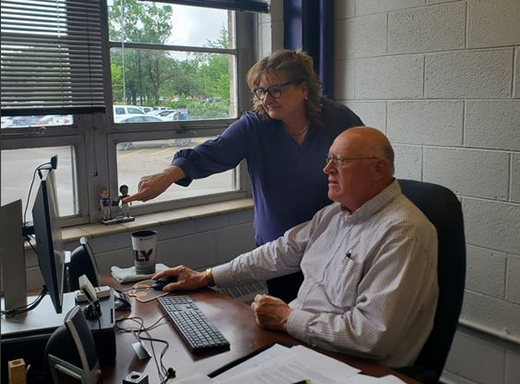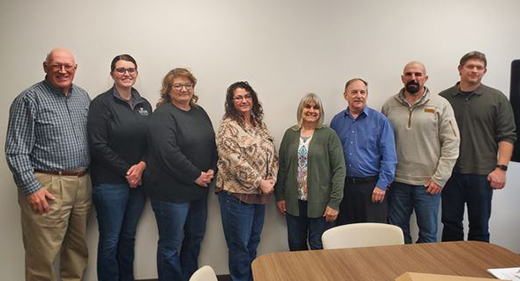K-State launches effort to heighten digital literacy in Kansas
Monday, Sept. 23, 2024

K-State's Digital Ambassador program will help improve broadband access for rural and underserved populations and help folks navigate the digital economy. The program is currently being piloted in three Kansas extension districts. Pictured above, Amy Collins, Kansas 4-H program coordinator, gives guidance to Ron Wilson, Digital Ambassador program coordinator. | Download this photo.
MANHATTAN — Kansas State University is establishing a program to improve broadband access for thousands of Kansans, helping them navigate the digital economy more safely and successfully.
The Digital Ambassador program is currently being piloted in the West Plains Extension District — Scott and Finney counties — the Central Kansas Extension District — Ottawa and Saline counties — and the River Valley Extension District — Republic, Washington, Cloud and Clay counties.
"A major emphasis of this program is to help people who live in rural areas or are otherwise underserved to utilize internet applications in a beneficial way," said Rick Peterson, associate director of extension programs for K-State Research and Extension. "For example, we envision that trained Digital Ambassadors will help people learn how to access telehealth, use online banking, utilize precision agriculture, and access government documents and other resources to benefit their businesses or families.
"Ultimately, we want to improve the lives of Kansans by helping them use the tools of technology safely and effectively."
According to a report from the Washington D.C.-based National Skills Coalition, 92% of today's jobs require digital skills, and investments in closing the digital skills divide can generate measurable economic payoff for businesses, workers and the broader economy.
The collaborative Digital Ambassadors program received initial financial support from K-State 105, which is Kansas State University's answer to the call for comprehensive economic growth and advancement solutions for Kansas.
K-State 105 leverages the statewide K-State Research and Extension network to deliver the full breadth of the university's collective knowledge and solution-driven innovation to every Kansan, right where they live and work.
Additionally, K-State 105 forges the connections and partnerships that create access to additional expertise within other state institutions and agencies, nonprofits and organizations — all part of an effort to build additional capacities and strengths in each of the 105 counties in the state.
Ron Wilson, coordinator of the Digital Ambassador program, said K-State 105 funds helped to position the state's extension system for a $526,998 award from the Kansas Office of Broadband Development through a program known as Digital Opportunities to Connect Kansans, or DOCK.
In May, Kansas Gov. Laura Kelly announced that the state was investing $2.8 million toward the DOCK program.
"The new DOCK grant will enhance and expand this initiative in two of the districts — West Plains and Central Kansas — where the program is currently being piloted," Wilson said.
Carol Ann Crouch, director of the West Plains Extension District, called digital literacy "critical for youth learning and job readiness skills and for adults to access services and jobs."
Central Kansas Extension District Director Cade Rensink added that the goal of the program is to increase digital literacy among county residents, including older adults and youth.
K-State Research and Extension agents have received training to offer the Digital Ambassador program in Kansas communities.
Wilson said the project includes numerous partners, including University of Missouri Extension; NetWork Kansas; the K-State Office of Engagement; the Kansas Bankers Association; the Kansas Center for Rural Health in the KU School of Medicine at Salina; the Kansas Department of Agriculture; the Kansas Association of Counties; the Office of Rural Prosperity in the Kansas Department of Commerce; Kansas Association of Community Action Programs; the Kansas Association of School Boards; the National Alliance for Mental Illness-Kansas; and several Kansas telecommunications companies and local libraries.
"We are excited about the potential of this program to help Kansas people bridge the digital divide of those who are underserved or who can better utilize broadband," Wilson said.
More information about K-State's Digital Ambassadors Program is available online. Learn more about K-State 105 at k-state.edu/105.

